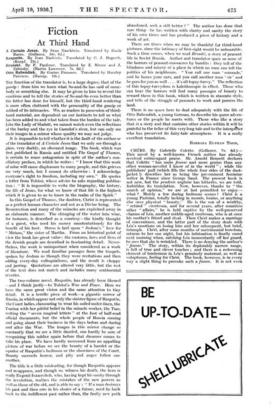.Fiction,
At Third Hand.
A Certain Jesus. By Iwan Naschiwin. Translated by Emile Burns. (Gollanez. 10s. 6d.) THE function of the translator is, to a large degree, that of the gossip : from him we learn what So-and-SO has said of some-
body or something else. It may be given to him to reveal the emotions and to tell the stories of So-and-So even better than the latter has done for himself, but the third-hand rendering is more often cluttered with the personality of the gossip or robbed of its intimacies. We, as readers in possession of third- hand material, are dependent on our instincts to tell us what
has been added to and what taken from the burden of the tale. Like the Lady of Shalott, we cannot watch even the reflections of the barley and the rye in Camelot's river, but can only see their images in a mirror whose quality we may not judge.
It is impossible to tell whether it is the fault of the author or
of the translator of A Certain Jesus that we only see through a glass, very darkly, an obscured image. The book, which was first published in Russia and entitled The Gospel of Thomas, is certain to rouse antagonism in spite of the author's con- ciliatory preface, in which he writes : "I know that this work
of mine will cause displeasure to many people, and this grieves me very much, but I cannot do otherwise : I acknowledge
everyone's right to freedom, including my own." He quotes a letter from Tolstoi, whose advice he asks regarding publica- tion: " It is impossible to write the biography, the history, the life of Jesus, for what we know of that life is the highest which it is given to us to know in the realm of the Spirit." In this Gospel of Thomas, the doubter, Christ is represented
as a perfect human character and not as a Divine being. The Resurrection and many of the miracles are explained away in anelaborate manner. The changing of the water into wine, for instance, is described as a courtesy—the kindly thought of a guest, who used his money unostentatiously for the benefit of his host. Stress is laid upon " Jeshua's " love for "Miriam," the sister of Martha. From an historical point of view the book has great value : the customs, laws and lives of the Jewish people are described in fascinating detail. Never- theless, the work is unimportant when considered as a work of literature. We read familiar passages from the Gospels, spoken by Jeshua as though they were recitations and then adding every-day colloquialisms, and the result is choppy and jarring. Quotations are altered very little, but the rest of the text does not match and includes many sentimental reveries.
The two-volume novel, Rasputin, has already been likened —and I think justly—to Tolstoi's War and Peace. Here we have the same great vision and the same attention to tiny detail. It is a terrific piece of work—a gigantic mirror of
Russia, in which appear not only the sinister figure of Rasputin, the Court ladies, clamouring to wear his soiled under-linen, the Tsarina with her pitiful belief in the miracle worker, the Tsar, writing the "seven magical letters" at the foot of half-read official documents, but the whole people of Russia coming and going about their business in the days before and during and after the War. The images in this mirror change so constantly that we are a little dazzled, can hardly be sure of recognizing this soldier again before that dreamer comes to take his place. We have hardly recovered from an appalling picture of war before we see the beauty of a hamlet or the squalor of Rasputin's bedroom or the showiness of the Court. Beauty succeeds horror, and pity and anger follow one another.
The title is a little misleading, for though Rasputin appears and re-appears, and though we witness his death, the hero is
really EvgenilIvanovitch, who, having kept his sanity through the revolution, realizes the mistakes of the new powers as well as those of the old, and is able to say : "If a man destroys his past and then errs in his eholee of a future, need, he hark back to the indifferent past rather than,. _the, faulty new path
abandoned, seek a still better ? " The author has done that rare thing—he has written with clarity and sanity the story of his own times and has produced a piece of history and a work of art.
There are times when we may be thankful far third-hand pictures, since the intimacy of first-sight would be unbearable. Such a time conies, when we read Brusski, a story of peasant life in Soviet Russia. Author and translator spare us none of the horrors of peasant-massacres by bandits : they tell of the blindness and misery of a place in which no man can tell the politics of his neighbours. "You call one man comrade,' and he boxes your ears, and you call another man ' sir ' and he goes for you as well. . . . it's all topsy-turvy." The reflection of this topsy-turvydom is kaleidoscopic in effect. Those who can bear the horrors will find many passages of beauty to reward them in this book, which is written in staccato style, and tells of the struggle of peasants to work and possess the land.
There is no space here to deal adequately with the life of Otto Babendiek, a young German, to describe his queer adven- tures or the people he meets with. Those who like a story that is a story and that contains other stories within it will be grateful to the teller of this verylong tale and to the interprtter who has preserved its fairy-tale atmosphere. It is a really excellent translation.
BARBARA EUPHAN TODD.










































 Previous page
Previous page